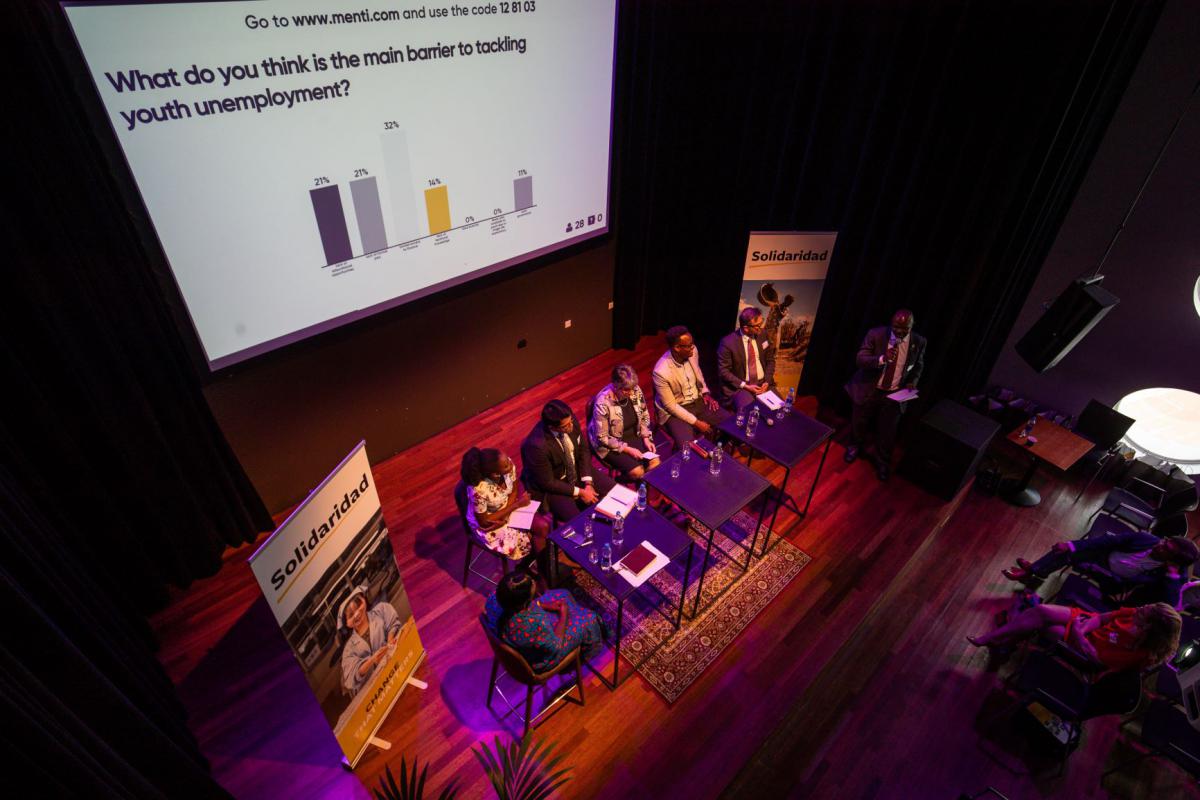
The panel on youth employment. On the screen behind the panelists: feedback from the audience on the question posed through the app Mentimeter
A variety of expertise on the stage
In this panel session, the panelists – under the moderation of Mandla Nkomo, managing director at Solidaridad Southern Africa – have exchanged their ideas about the root problems that form a barrier to sustainable and inclusive youth employment as well as the opportunities for solutions. The audience was also invited to participate through the app Mentimeter, in which they could easily give their responses to the audience questions. The answers were directly presented on the large screen on the stage.
The panel consisted of international representatives: Mawuse Hotor, a young cocoa farmer from Ghana (she also gave the keynote speech at the conference); Eric Kaduru, a social entrepreneur from Uganda and founder of KadAfrica; Marina Diboma, deputy director at NABC; Sami Khan, director of strategy, food and agriculture at CDC Group Plc; Rahul Gopinath, regional director Africa at ECOM Agro Industrial Corporation; and Reina Buijs, director general international cooperation at the Netherlands Ministry of Foreign Affairs.
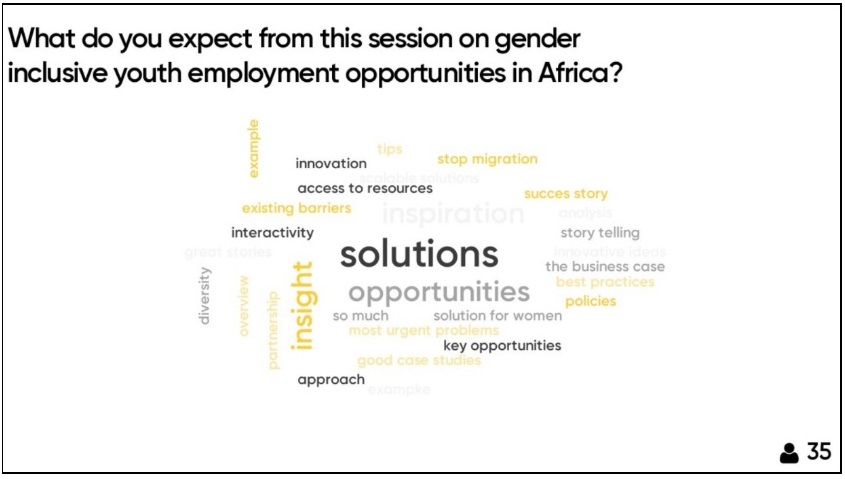
Feedback from the audience at the start of the panel discussion
‘The three-legged chair’ for youth employment
When asked about the support required by young people to get involved in agriculture and to access jobs, cocoa farmer Mawuse Hotor hit the nail on the head by speaking from experience. She named three elements as crucial: skills training, financial support (e.g. start-up capital) for entrepreneurs, and inclusion as a societal issue.
In terms of skills training, she explained that the youth are willing to work but often lack the necessary training, including soft and on-the-job skills. Secondly, young people need start-up capital to begin their business and they require financial support to realize this. And thirdly, inclusion as a societal issue is an important factor. Young women, for instance, are willing to participate in the dynamics of the job market but often lack the necessary resources, frequently due to additional gender barriers. Access to land is among these challenges: Mawuse herself has experienced the difficulty of acquiring a piece of land as a young, female cocoa farmer in Ghana.
With this, Mawuse identified a so-called ‘three-legged chair’ which is needed to ensure inclusive youth employment, as Mandla Nkomo summarized it.
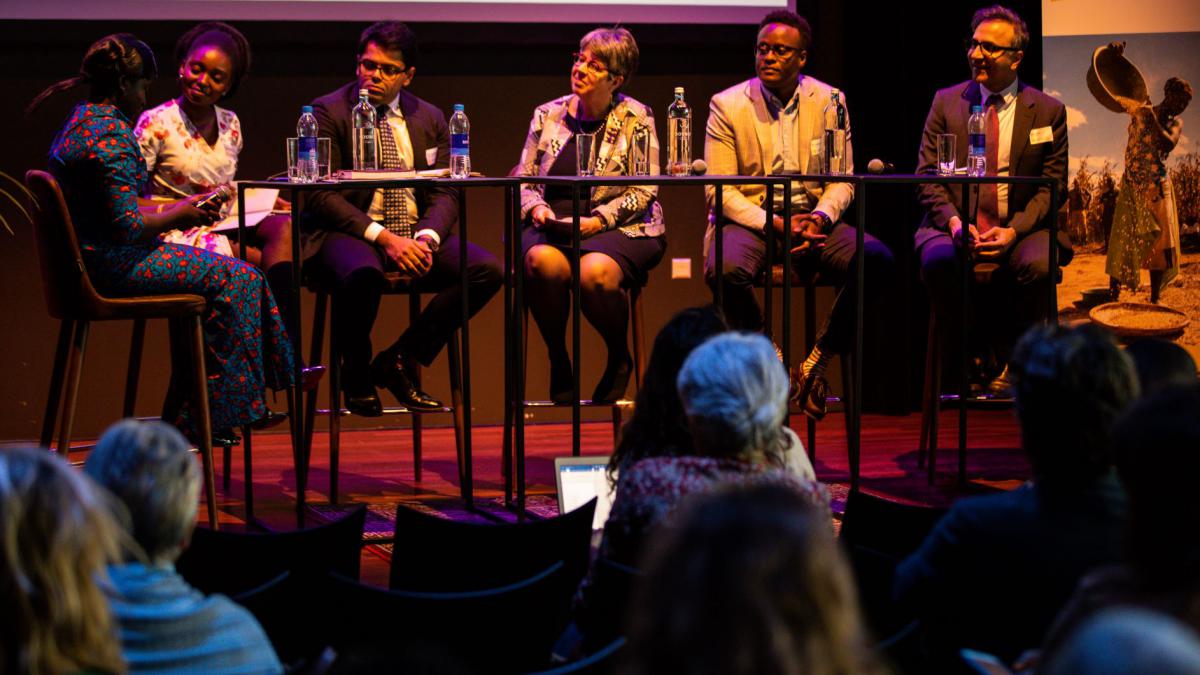
The panel in discussion. From left to right: Mawuse Hotor, Marina Diboma, Rahul Gopinath, Reina Buijs, Eric Kaduru, and Sami Khan
Investing in youth = investing in African potential
“You gave all the answers,” Reina Buijs said following Mawuse’s explanation. She elaborated:
Africa has huge potential and investing in youth means investing in African potential. Investing in and including women is essential: they are the motor of what’s going on at home, at work and in the community.
However, those who have enjoyed education opportunities do not always receive the right skills they need to use as employees, such as social skills necessary on the work floor. These young people are thus not yet ‘future-proofed’, Buijs warned.
Eric Kaduru, a social entrepreneur, noted that he sees many young people struggling with similar challenges which have been overcome by Mawuse. Kaduru’s company is tackling the challenge of finding land in a creative way: they have found partners that are land owners and have brought them together with people who need the land (thus creating such a ‘three-legged chair’ situation).
"Mawuse is the epitome of what happens when you provide women with opportunities,” Kaduru said, adding another such example of a young entrepreneurial woman his company has worked with.
This video highlights the importance of stimulating gender-inclusive youth employment in Africa:
No longer ‘business as usual’
So what are the role and the responsibility of the corporations operating in Africa? Rahul Gopinath of ECOM Agro industrial corporation, which has now been operating in Africa for 25 years, emphasized the importance of having the country grow with its people. People are really changing the market, especially as increasingly more women are accessing the job arena. Human capital has become essential: as Mandla Nkomo summed it up, there is a business case to be made for human capital and how people are changing the job market in Africa.
Gopinath also mentioned the important role of access to finance (for rural farmers). There should also be more nuance made between, for instance, the urban poor and rural farmers.
Sami Khan could add on to this well: it is absolutely essential to create an enabling environment in which the youth, especially women, are able to access financial resources. Looking at access to finance from a long-term perspective and at the so-called ‘catalyst capital’ (longer term duration capital with which it is possible to take risks) are part of this solution.
Prioritizing the creation of such an enabling environment means that it can no longer be a case of ‘business as usual’, as Nkomo notably put it in response to Khan’s input.
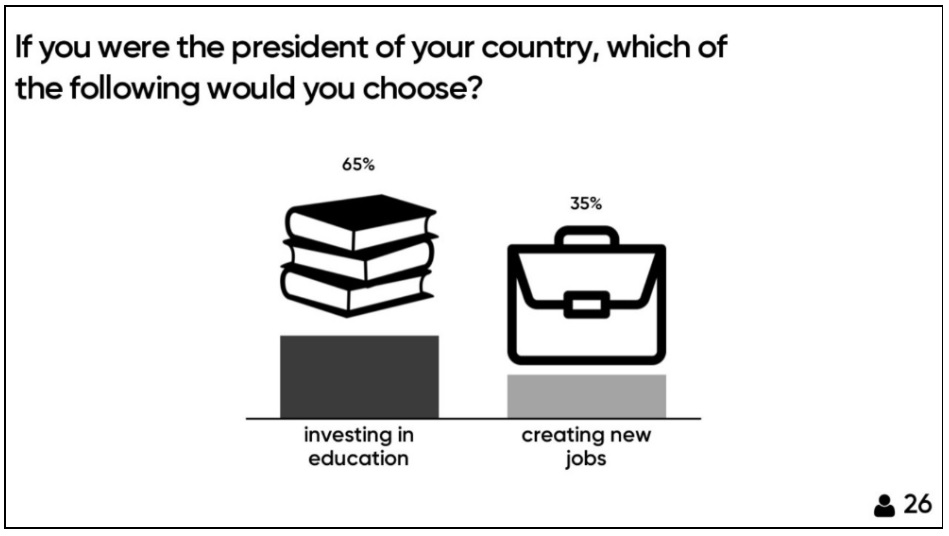
Audience feedback on this question was directly visible on the screen
Creating a safe and stimulating environment for women
Ensuring that both men and women are part of the solution in creating gender-inclusive employment opportunities starts with confidence, said Marina Diboma. There needs to be a safe environment in which young women can work without fear of harassment and with self-confidence. There are still many problems of harassment on the work floor which are not being addressed, and young people – especially women – need protection from these. Local governments must be engaged to enforce the proper laws to solve this issue.
Soft skills training, coaching and mentoring young people; ensuring they know their rights as employees and what is expected of them on the job, and providing them with a career development path and prospects are all factors needed to make up the equation. Diboma also stressed that women are essential in helping to build up the value chain, and play an important role in (agricultural) entrepreneurship and sector transformation.
The best business partners in Africa are women.
Changing perceptions about agriculture
Sami Khan pointed out that changing the current perception about agriculture and ensuring that it is viewed as both an enjoyable as well as profitable profession is important. As Reina Buijs also put it, what we also need in farmers nowadays is an entrepreneurial attitude.
A successful far
mer is hereby also an entrepreneur, and access to finance is among the leading factors which can help to influence this in a positive way. As the figure below shows, ‘limited access to finance’ also received the most audience votes in response to the question about barriers to tackling youth unemployment.
As Rahul Gopinath expressed as well, we need a paradigm shift in how we approach access to finance and youth employment. We must tackle socio-cultural barriers, encourage management programmes for women, establish partnerships in order to create an enabling ecosystem for sustainable change.
And Marina Diboma also pointed out that we need an integrated approach which includes all the stakeholders. The role of the private sector must hereby not be forgotten: young people must have sufficient opportunities to put their training in practice; that is essential for creating change.
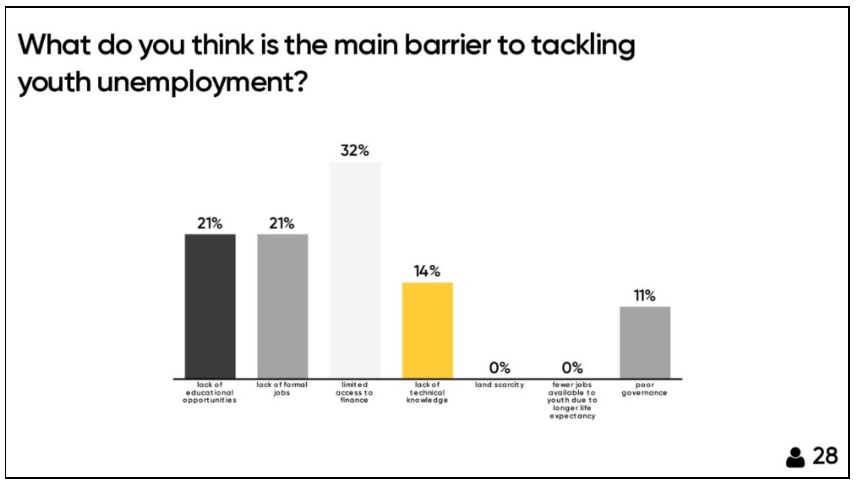
Audience feedback on the following question was directly visible on the big screen, with ‘limited access to finance’ in the lead with 32%
‘Affecting eternity, planting people’
Based on the input from the panelists, Mandla Nkomo brought the essence of the discussion to the following three pillars: the importance of skills development (technical as well as soft and social skills); access to finance for entrepreneurs; and stimulating inclusivity throughout all aspects of employment. Companies, for instance, need to be deliberate about the ways in which they operate: for instance, regarding the partners they work with and in their employment procedures.
To conclude the session, Nkomo shared the following idea, based on a similar, well-known saying by the Chinese philosopher Confucius:
If you want to affect a year, plant corn;
If you want to affect a generation, plant trees;
And if you want to affect eternity, plant people.
Solidaridad works on a number of programmes in Africa which stimulate gender-inclusive youth training and employment, such as the cocoa MASO programme. Mawuse Hotor is one of its graduates. The video below tells more:
For more information on the panel, please see the anniversary conference page.
This article gives more highlights about the morning conference programme, including Mawuse’s keynote speech and an overview of the other panels.
